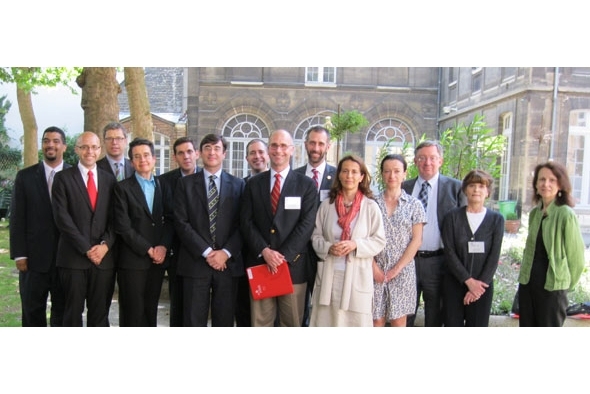

St. John’s scenic Paris campus was the setting for Laïcité in Comparative Perspective, the Center for Law and Religion’s inaugural academic conference held earlier this summer. Scholars from a cross-section of universities in Europe and the United States came together for a lively roundtable discussion and debate on religious liberty in France, the United States, and other countries. The participants were:
- Christopher Borgen (St. John’s Law School)
- Nathalie Caron (Université Paris-Est Créteil)
- Blandine Chelini-Pont (Université Paul Cézanne Aix-Marseille)
- Nina Crimm (St. John’s Law School)
- Marc DeGirolami (St. John’s Law School)
- Douglas Laycock (University of Michigan Law School)
- Javier Martinez-Torrón (Universidad Complutense de Madrid)
- Mark Movsesian (St. John’s Law School)
- Rosemary Salomone (St. John’s Law School)
- Brett Scharffs (BYU Law School)
- Michael Simons (St. John’s Law School)
- Emmanuel Tawil (Université Panthéon-Assas (Paris 2)
- Elisabeth Zoller (Université Panthéon-Assas (Paris 2)
Conference Program
Douglas Laycock, the Yale Kamisar Collegiate Professor of Law at the University of Michigan Law School, opened the conference with a compelling keynote on American Religious Liberty, French Laïcité, and the Veil. Referring to the American and French approaches to religious liberty as “distant cousins,” he argued that the divergence from common roots results from cultural and historical differences.
The Conference continued with two panels. The first addressed current issues in laïcité − the French model of church-state relations − including the proposed ban on burqas in public places, the existing ban on Islamic headscarves and other conspicuous religious symbols in France’s public schools, and the rise of militant secularism in the country. The second panel compared laïcité with church-state relations in other countries, including Spain and the United States.
The high-quality presentations sparked substantive and enlightening roundtable exchanges. Participants fully engaged each other’s ideas with respect and honesty, offering a range of perspectives. For example, while some favored a ban on conspicuous religious symbols in public schools, others argued that the ban infringed on religious freedom and questioned its necessity. “This was more than just a robust academic dialogue,” Dean Simons noted. “It was a highly informed exploration of real world issues of religious expression that impact the daily lives of people throughout the world – from the smallest villages to the largest cities to our own St. John’s community.”
“This event was a perfect way to inaugurate the Center for Law and Religion,” said Professor Movsesian, the Center’s Director. “One of our main goals is to advance St. John’s Vincentian mission by promoting open dialogue on law and religion around the world. Studying laïcité in a comparative way is entirely consistent with that mission. Our exchanges were candid, sometimes even provocative. We’re going to publish the Conference proceedings in a forthcoming issue of the Journal of Catholic Legal Studies and post video clips on our website. This archive will be a valuable resource for students and faculty who want to gain insight into important issues involving religious liberty.”
Established in 2010, the Law School’s Center for Law and Religion provides a forum for the study of law and religion from domestic, international and comparative perspectives. In addition to hosting academic conferences and speakers from academia and public life, it also coordinates the Law School’s law and religion curriculum and promotes dialogue among scholars with different viewpoints, both religious and non-religious.
For more information on the Center, its programs and other activities, please contact Professor Movsesian at [email protected].
Related News
Law Matters: A Conversation With Professor Robin Boyle-Laisure
In this installment of our Law Matters story series, Dean Jelani Jefferson Exum speaks with Professor Robin Boyle-Laisure about her scholarship and advocacy addressing cults and human trafficking...
St. John’s University School of Law Receives Historic Gift to Name DiMartino/Smith Public Interest Center
Dean Jelani Jefferson Exum has announced that the Public Interest Center at St. John’s Law will be named the DiMartino/Smith Public Interest Center in honor of alumna Rose DiMartino ’81 and her spouse...
Exploring Law and Religion in Global Context: A Month with the Mattone Center
For 15 years, the Denise ’90 and Michael ’91 Mattone Center for Law and Religion has been a vibrant forum for exploring the intersection of law and religion across domestic, international, and...
